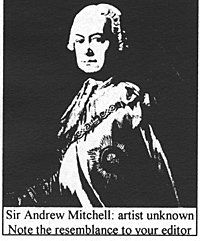 Edited by Andrew Bisset
Edited by Andrew Bisset
Republished by Pallas Armata (2000) and available from Gareth Simon, 98 Priory Road, Tonbridge, Kent, UK TN9 2BP. Approximately 1000 pages in 18 card-bound volumes. Price: £27 plus postage.
With one brief interlude, Sir Andrew Mitchell was the British Minister accredited to Frederic the Great from 1756 until his death in 1771. He took his duties extremely seriously following the King into the field and was present in person at several notable engagements. When not with the King, Mitchell would be found with Prince Henry or with Marshal Keith. Only later in the war did his infirmities oblige him to remain behind, but never far from the front.
Mitchell - to his chagrin he was not knighted until after the war despite his pleas that the enhancement of status would enable him to be more effective in his role - saw his duties as promoting concord between the two Courts. Despite the prompting of politicians in London, he declined to report gossip and the biting sarcasm of the King.
His job was far from easy. In the early years of the war, he had to explain the lack of direct military support for the King, especially the vexed question of the Baltic squadron that would have done so much to hamper the Swedes and Russians. When others in the Court Circle noted that he no longer was invited to dine with the King, Mitchell responded: "Alas gentle-men, no fleet no dinner." Such is the world of "realpolitik". He also had to cope with the machinations of the Hanoverian Ministry, who operated an inde-pendent foreign policy. Most difficult of all was how to explain the withdrawal of the subsidy in 1762. In his diplomatic correspondence, he had to keep informed the various elements of the British Government, who do not always appear to operate in harmony.
Despite all his tribulations, Mitchell maintained the confidence of the King and of all his correspondents through his exceptional strength of character.
Although not a military man, Mitchell recorded his impressions of those events to which he was witness including the bombardment of Prague, the battle of Zorndorf and a vignette of "the most uncomfortable hour of my life" at the battle of Leignitz. The latter has been replayed in a thousand "Westerns"!
A firm admirer of the Frederic, Mitchell was not blind to his faults. Indeed, he is scathing of his vanity and financial incompetence.
As a fellow Scot, although one of Whig rather than Jacobite persuasion, Mitchell formed a close friendship with Marshal Keith. Not the least important part of this work is the last two volumes that provide a sympathetic portrait of that fine soldier. It includes the eyewitness account of the heroic death of the Marshal at Hochkirch by the English volunteer John Tebay in a letter (in its original spelling) written to Mitchell soon after the event.
Andrew Bisset allows his subject to speak through his letters, dispatches and journals with little connecting text. Nearly all the text is in English, the exception being the letters from the King and Prince Henry to Mitchell, which are in their original French. There are some gaps, and the reader will need to be familiar with the general chronology of events to be assured of continuity.
Recommendation: Do not miss this opportunity to purchase this fascinating account.
Back to Seven Years War Asso. Journal Vol. XII No. 3 Table of Contents
Back to Seven Years War Asso. Journal List of Issues
Back to Master Magazine List
© Copyright 2001 by James J. Mitchell
This article appears in MagWeb (Magazine Web) on the Internet World Wide Web.
Other articles from military history and related magazines are available at http://www.magweb.com